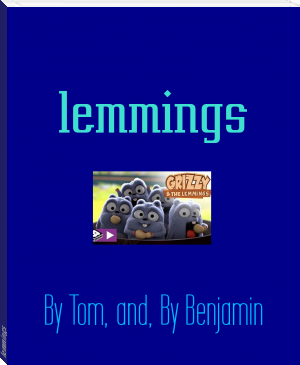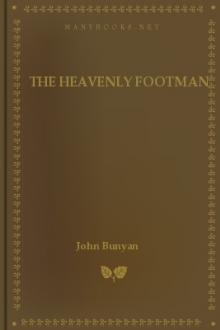The Children's Own Longfellow - Henry W. Longfellow (ebook smartphone TXT) 📗

- Author: Henry W. Longfellow
Book online «The Children's Own Longfellow - Henry W. Longfellow (ebook smartphone TXT) 📗». Author Henry W. Longfellow
howled. Late, with the rising moon, returned the wains from the marshes, Laden with briny hay, that filled the air with its odor. Cheerily neighed the steeds, with dew on their manes and their fetlocks, While aloft on their shoulders the wooden and ponderous saddles, Painted with brilliant dyes, and adorned with tassels of crimson, Nodded in bright array, like hollyhocks heavy with blossoms. Patiently stood the cows meanwhile, and yielded their udders Unto the milkmaid's hand; whilst loud and in regular cadence Into the sounding pails the foaming streamlets descended. Lowing of cattle and peals of laughter were heard in the farm-yard, Echoed back by the barns. Anon they sank into stillness; Heavily closed, with a jarring sound, the valves of the barn-doors, Rattled the wooden bars, and all for a season was silent.
PART THE FIRST II Pg 8
In-doors, warm by the wide-mouthed fireplace, idly the farmer Sat in his elbow-chair and watched how the flames and the smoke-wreaths Struggled together like foes in a burning city. Behind him, Nodding and mocking along the wall, with gestures fantastic, Darted his own huge shadow, and vanished away into darkness. Faces, clumsily carved in oak, on the back of his arm-chair Laughed in the flickering light; and the pewter plates on the dresser Caught and reflected the flame, as shields of armies the sunshine. Fragments of song the old man sang, and carols of Christmas, Such as at home, in the olden time, his fathers before him Sang in their Norman orchards and bright Burgundian vineyards. Close at her father's side was the gentle Evangeline seated, Spinning flax for the loom, that stood in the corner behind her. Silent awhile were its treadles, at rest was its diligent shuttle, While the monotonous drone of the wheel, like the drone of a bagpipe, Followed the old man's song and united the fragments together. As in a church, when the chant of the choir at intervals ceases, Footfalls are heard in the aisles, or words of the priest at the altar, So, in each pause of the song, with measured motion the clock clicked.
Thus as they sat, there were footsteps heard, and, suddenly lifted, Sounded the wooden latch, and the door swung back on its hinges. Benedict knew by the hob-nailed shoes it was Basil the blacksmith, And by her beating heart Evangeline knew who was with him. "Welcome!" the farmer exclaimed, as their footsteps paused on the
threshold, "Welcome, Basil, my friend! Come, take thy place on the settle Close by the chimney-side, which is always empty without thee; Take from the shelf overhead thy pipe and the box of tobacco; Never so much thyself art thou as when through the curling Smoke of the pipe or the forge thy friendly and jovial face gleams Round and red as the harvest moon through the mist of the marshes."
PART THE FIRST II Pg 9
Then, with a smile of content, thus answered Basil the blacksmith, Taking with easy air the accustomed seat by the fireside:-- "Benedict Bellefontaine, thou hast ever thy jest and thy ballad! Ever in cheerfullest mood art thou, when others are filled with Gloomy forebodings of ill, and see only ruin before them. Happy art thou, as if every day thou hadst picked up a horseshoe." Pausing a moment, to take the pipe that Evangeline brought him, And with a coal from the embers had lighted, he slowly continued:-- "Four days now are passed since the English ships at their anchors Ride in the Gaspereau's mouth, with their cannon pointed against us. What their design may be is unknown; but all are commanded On the morrow to meet in the church, where his Majesty's mandate Will be proclaimed as law in the land. Alas! in the mean time Many surmises of evil alarm the hearts of the people." Then made answer the farmer: "Perhaps some friendlier purpose Brings these ships to our shores. Perhaps the harvests in England By untimely rains or untimelier heat have been blighted, And from our bursting barns they would feed their cattle and children." "Not so thinketh the folk in the village," said, warmly, the blacksmith, Shaking his head, as in doubt; then, heaving a sigh, he continued:-- "Louisburg is not forgotten, nor Beau Sejour, nor Port Royal, Many already have fled to the forest, and lurk on its outskirts, Waiting with anxious hearts the dubious fate of tomorrow. Arms have been taken from us, and warlike weapons of all kinds; Nothing is left but the blacksmith's sledge and the scythe of the mower." Then with a pleasant smile made answer the jovial farmer:-- "Safer are we unarmed, in the midst of our flocks and our cornfields, Safer within these peaceful dikes, besieged by the ocean, Than our fathers in forts, besieged by the enemy's cannon. Fear no evil, my friend, and to-night may no shadow of sorrow Fall on this house and hearth; for this is the night of the contract. Built are the house and the barn. The merry lads of the village Strongly have built them and well; and, breaking the glebe round about
them, Filled the barn with hay, and the house with food for a twelvemonth. Rene Leblanc will be here anon, with his papers and inkhorn. Shall we not then be glad, and rejoice in the joy of our children?" As apart by the window she stood, with her hand in her lover's, Blushing Evangeline heard the words that her father had spoken, And, as they died on his lips, the worthy notary entered.
PART THE FIRST III Pg 10Bent like a laboring oar, that toils in the surf of the ocean, Bent, but not broken, by age was the form of the notary public; Shocks of yellow hair, like the silken floss of the maize, hung Over his shoulders; his forehead was high; and glasses with horn bows Sat astride on his nose, with a look of wisdom supernal. Father of twenty children was he, and more than a hundred Children's children rode on his knee, and heard his great watch tick. Four long years in the times of the war had he languished a captive, Suffering much in an old French fort as the friend of the English. Now, though warier grown, without all guile or suspicion, Ripe in wisdom was he, but patient, and simple, and childlike. He was beloved by all, and most of all by the children; For he told them tales of the Loup-garou in the forest, And of the goblin that came in the night to water the horses, And of the white Letiche, the ghost of a child who unchristened Died, and was doomed to haunt unseen the chambers of children; And how on Christmas eve the oxen talked in the stable, And how the fever was cured by a spider shut up in a nutshell, And of the marvellous powers of four-leaved clover and horseshoes, With whatsoever else was writ in the lore of the village. Then up rose from his seat by the fireside Basil the blacksmith, Knocked from his pipe the ashes, and slowly extending his right hand, "Father Leblanc," he exclaimed, "thou hast heard the talk in the village, And, perchance, canst tell us some news of these ships and their errand." Then with modest demeanor made answer the notary public,-- "Gossip enough have I heard, in sooth, yet am never the wiser; And what their errand may be I know not better than others. Yet am I not of those who imagine some evil intention Brings them here, for we are at peace; and why then molest us?" "God's name!" shouted the hasty and somewhat irascible blacksmith; "Must we in all things look for the how, and the why, and the wherefore? Daily injustice is done, and might is the right of the strongest!" But without heeding his warmth, continued the notary public,-- "Man is unjust, but God is just; and finally justice Triumphs; and well I remember a story, that often consoled me, When as a captive I lay in the old French fort at Port Royal."
PART THE FIRST III Pg 11This was the old man's favorite tale, and he loved to repeat it When his neighbors complained that any injustice was done them. "Once in an ancient city, whose name I no longer remember, Raised aloft on a column, a brazen statue of Justice Stood in the public square, upholding the scales in its left hand, And in its right a sword, as an emblem that justice presided Over the laws of the land, and the hearts and homes of the people. Even the birds had built their nests in the scales of the balance, Having no fear of the sword that flashed in the sunshine above them. But in the course of time the laws of the land were corrupted; Might took the place of right, and the weak were oppressed, and the mighty Ruled with an iron rod. Then it chanced in a nobleman's palace That a necklace of pearls was lost, and





Comments (0)